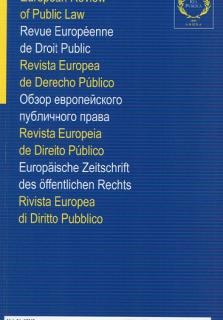
Constitutional Law / Droit constitutionnel
SERBIA / SERBIE
TANASIJE MARINKOVIĆ
Assistant Professor, Faculty of Law University of Belgrade
Freedom of association is highly appreciated in constitutional democracies as it allows the individuals to wield an influence on policy-making, commensurate to the strength of their group. However, this freedom, like all other political freedoms with which democracy is identified, may be used for the destruction of democracy itself. This is why post-World War II Western constitutions and international treaties, parallel to recognizing and protecting the right to association, provide conditions for its limitation and even for the closure of associations. Central and Eastern Europe followed this model, after the collapse of the single party system, especially since the introduction of political pluralism in these countries was accompanied with the growth of political extremism and hate speech. And although Central and East European countries have opted for the concept of vigilant democracy in their legislation, the enforcement of these measures has proven much less successful, due to the different (and sometimes hidden) agendas in their judicial politics. The same wrestling with political extremism is observable in Serbia, as demonstrated by the inconsistent case-law of its Constitutional Court in the field of closure of associations. This chronicle investigates this case-law and the concepts over which the Court stumbled, namely, whether an unregistered association can be banned, what a secret association is, and what the legal nature of the banning procedure is.
La liberté d'association est très appréciée au sein des démocraties constitutionnelles, puisqu'elle permet aux individus d'influencer l'élaboration des politiques proportionnellement à la puissance de leur groupe. Par contre, c'est cette liberté, comme toute autre liberté politique régissant le régime de la démocratie, qui peut être utilisée pour détruire la démocratie elle-même. C'est pourquoi, les constitutions de l'Ouest et les traités internationales de l'après deuxième guerre mondiale reconnaissent et protègent le droit d'association tout en assurant les conditions sous les¬quelles l'activité des associations se limite ou se termine. L'Europe centrale et orientale a suivi ce modèle après l'effondrement du système de parti unique, particulièrement parce que l'introduction du pluralisme politique dans ces pays a été accompagnée par le développement de l'extrémisme politique et des discours de haine. Malgré le fait que les pays de l'Europe centrale et orientale ont opté pour le concept d'une démocratie vigilante au niveau législatif, l'application de ces mesures a été prouvé bien inefficace, à cause des agendas différents (sinon cachés) dans leur politique judiciaire. Les mêmes efforts de lutte contre l'extrémisme politique peuvent être observés en Serbie, ce qui a été démontré dans la jurisprudence contradictoire de sa Cour constitutionnelle en matière de fermeture des associations. Cette chronique examine, alors, cette jurisprudence ainsi que les concepts sur lesquels la Cour a trébuché, à savoir si une association non enregistrée peut être interdite, en quoi consiste une association secrète et quelle est la nature juridique de la procédure d'interdiction.





















